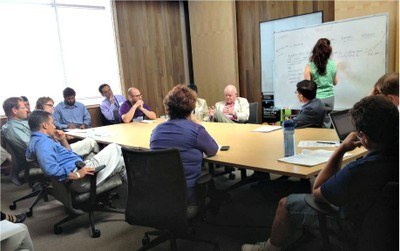 The Foods for Health Institute jointly with the UC Davis Comprehensive Cancer Center, the Clinical and Translational Science Center, and the Western Human Nutrition Research Center hosted a translational innovation forum to discuss the topic of obesity, inflammation, and cancer. The workshop brought over sixty participants from across campus together to brainstorm how to solve the problems of inflammation and obesity as they relate to cancer incidence, progression, and treatment.
The Foods for Health Institute jointly with the UC Davis Comprehensive Cancer Center, the Clinical and Translational Science Center, and the Western Human Nutrition Research Center hosted a translational innovation forum to discuss the topic of obesity, inflammation, and cancer. The workshop brought over sixty participants from across campus together to brainstorm how to solve the problems of inflammation and obesity as they relate to cancer incidence, progression, and treatment.
The day-long event sought to investigate three key objectives: 1) determining the role of metabolic dysregulation and adipocyte dysfunction resulting in pro-inflammatory state on cancer incidence and progression; 2) how the gut microbiome impact inflammation, cancer growth, progression, and therapy; and 3) the impact of fat content, metabolic dysregulation and the resulting pro-inflammatory state on chemotherapy and other cancer therapies.
The event began with key overview presentations by Bruce German of the Foods for Health Institute, Bruce Hammock of the UC Davis Comprehensive Cancer Center, Primo Lara, Associate Director for Translational Research at the UC Davis Comprehensive Cancer Center, William Murphy of the Cancer Center Inflammation Initiative, Lars Berglund, Associate Executive Dean for Research in the School of Medicine, and Ramsey Badawi, Director of Research in the Division of Nuclear Medicine. These presentations introduced a plenary brainstorming session to identify major questions related to the key objectives of the workshop.
In identifying these major questions, the workshop participants drew correlations between the issues of obesity, inflammation, and cancer. Some major considerations included identifying which cancer populations or populations at risk for cancer would benefit from nutritional interventions and what measures of a medical, clinical, or biological nature could be deployed. Considering the role of the gut microbiome, participants considered the biological role played by the microbiome in advancing cancer risk and etiology and how probiotics could potentially complement cancer therapies. Lastly, participants considered whether a patient’s pro-inflammatory state associated with high body fat content result in heightened side-effects of cancer therapies, and whether there might be personalized strategies developed to assess how metabolic syndrome affects cancer survivorship.
Presentations
- Dr. Ramsey Badawi, "High-Resolution Molecular Imaging in Human with PET"
- Dr. Bruce Hammock, "Inhibitors of the Soluble Epoxide Hydralose Treat of a Variety of and Obesity Driven Diseases"
Break-Out Sessions
The workshop concluded with break-out sessions designed to address the key topic areas that build on existing UC Davis strengths and expertise in the area of obesity, inflammation and cancer research with the goal of obtaining larger grant funding to start multi-disciplinary collaborative projects. Participant leaders are currently putting together a white paper summarizing the major contributions of the workshop and developing next steps for grant opportunities and more specific projects that will advance the questions raised in the workshop.
Springboards for discussion prepared by:
- William Murphy, PhD – Leader, Cancer Center Inflammation Initiative
- Primo Lara, MD – Associate Director for Translational Research, UC Davis Comprehensive Cancer Center
- Bruce German, PhD – Director, Foods for Health Institute
- Jennifer Smilowitz, PhD – Associate Director, Foods for Health Institute
- Angela Zivkovic, PhD – Associate Director, Foods for Health Institute
- Joel Kugelmass – Senior Analyst, UC Davis Comprehensive Cancer Center